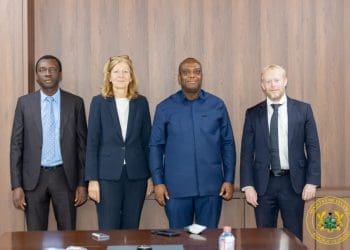Chief Executive Officer (CEO) of MTN Ghana, Stephen Blewett, has called on Ghanaian business leaders to embrace a transformative approach to economic growth, urging them to support the government’s reset agenda by “doing business unusual.”
Speaking at the 9th Ghana CEOs Summit, Blewett said the structural reform of the Ghanaian economy would require courageous leadership from the private sector and stronger collaboration with the government.
According to him, despite the many economic challenges confronting businesses today, there exists an equal number of opportunities, particularly through leveraging Ghana’s youthful population and the increasing accessibility of breakthrough technologies.
He emphasised that the private sector must seize this moment and use emerging tools to leapfrog traditional models and accelerate innovation and growth.
Technology and belief as catalysts for innovation
In an impassioned address, Blewett urged his fellow CEOs to believe in the power of Africa to become a global innovation hub. He challenged them to create the conditions that will allow the next big idea to emerge from the continent.
He warned that without the conviction that innovation can originate from Africa, the continent risks missing out on the future.
“If we in business do not believe, do not have the faith that the next big innovation will come from this continent, it will not happen,” he said.
As evidence of MTN Ghana’s confidence in the country’s economic future, Blewett disclosed that the telecoms giant has already invested over $1 billion in digital infrastructure between 2021 and 2025.
This commitment, he explained, is a sign of faith in Ghana’s long-term potential.
“We committed to investing $1 billion, and we’ve done it. And we will continue to invest in Ghana. Why? Because we believe in the future of our country, we believe in its potential, and we believe in what the government is doing. We believe in the reset,” he said.
A new economic model
Blewett stressed the importance of nurturing Ghana’s young population by investing in skills and job creation.
He called on his colleagues in the private sector to leverage every resource—intellectual, financial, and human—to help build an economic system capable of delivering inclusive growth.
“Let’s all work together to ensure that using the skills that we have in this room, we use every resource that we have, every mental capability we have, to create jobs, to create a country and an economic system that allows for growth,” he said.
Mahama backs private sector role
Addressing the summit, President John Dramani Mahama highlighted the critical role of the private sector in Ghana’s economic reset.
He said that the road to sustainable development and inclusive prosperity required a renewed compact between government and business—one built on mutual accountability, shared risks, and shared rewards.
“The time has come for us to lift the gloom, to restore confidence, and to build again. Ghana is open for business again,” Mahama said.
To support this new relationship, Mahama announced plans to establish a national business consultative platform.
This mechanism, he explained, will enable regular dialogue between the government and business leaders, allowing companies to offer feedback on key policy reforms and co-develop practical solutions for economic challenges.
Outlining a comprehensive economic reset strategy
Mahama also outlined a comprehensive reset strategy to anchor Ghana’s economic transformation.
The proposed framework centres on maintaining fiscal discipline, ensuring debt sustainability, supporting local industry, and expanding infrastructure financing through public-private partnerships.
He reassured the private sector that future borrowing by the state would be done prudently, ensuring that macroeconomic stability efforts do not stifle access to credit or crowd out private investment.
“Access to credit and capital markets will not crowd you out. We will borrow responsibly to ensure space for your businesses to grow,” he promised.
National dialogue and vision
Held under the theme “Leading Ghana’s Economic Reset: Transforming Business and Governance for a Sustainable, Futuristic Economy,” the summit brought together leading figures from across the public and private sectors—including CEOs, investors, policymakers, and development experts.
The event served as a vital forum for shaping policy direction, identifying new investment opportunities, and driving collaborative initiatives that can accelerate Ghana’s development.
Discussions at the summit were particularly focused on opportunities in the technology, finance, and manufacturing sectors.
The challenge before business leaders is no longer simply to survive, but to innovate, collaborate, and build a new, inclusive future for Ghana.














